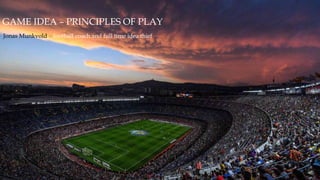
Football Theory Jonas Munkvold
- 1. GAME IDEA – PRINCIPLES OF PLAY Jonas Munkvold – football coach and full time idea thief
- 2. Football philosophy Football is communication. If the club speaks the same language it is an orchestra. If not it is a mess. Objective football philosophy From evidence-based coaching “Application is everything” Subjective decision making JONAS MUNKVOLD, 2017
- 3. THEORY o The aim of the Game Model is to make complex situations simpler for the players by first disassembling the situation like a puzzle and then reassembling it step by step o Our play is based on the our training sessions, based on our game model, that is based on our player characters, that is based on our principles of play that is build from the head coach’s game idea o Tactics are how we plan to win the game, but it all starts in training. Game Idea DNA Principle s of Play Player Characte r Game Model Training JONAS MUNKVOLD, 2017
- 4. Phases of the Game Transition to attack - Exploit imbalance - 6 seconds Attack Reactive 1. Build up 2. Scoring Defence Proactive 1. Disturb build up 2. Deny scoring JONAS MUNKVOLD, 2017
- 5. FOOTBALL ACTIONS o The logical structure of football actions o Communication Tactical o Collect information o Decision making Game insight o Chose a solution o Execution Technique o Execute the solution o Repetition Football Fitness o Better action, more frequent action JONAS MUNKVOLD, 2017
- 6. COMMUNICATION INTERACTION TO GATHER INFORMATION Purpose: To improve predictability for team mates and increase speed of action Team quality – one player can, by definition, not be “tactically strong” You cannot wave to yourself Requires interaction between two or more players Verbal, non-verbal, voluntarily, involuntarily, obvious, hidden JONAS MUNKVOLD, 2017
- 7. DECISION MAKING GAME INSIGHT What solutions are there? Based on information collected What can I do to help the team in this situation JONAS MUNKVOLD, 2017
- 8. EXECUTION FOOTBALL: EXECUTION OF DECISION GYMNASTICS: EXECUTION OF EXECUTION Often isolated – because it is the only aspect that can be seen from the sidelines “U8’s cannot play – they need to learn to pass” Development of the worlds best? Streets 10v1on a large area? 3v0? JONAS MUNKVOLD, 2017
- 9. FOOTBALL FITNESS Better action: x X More frequent action: X—X X-X Football: X—X—x---x---x Higher level: X-X-X—X—X JONAS MUNKVOLD, 2017
- 10. FOOTBALL FITNESS FOOTBALL X-X--X--X----X HIGHER LEVEL FOOTBALL X-X-X- X-X-X What is the characteristics of higher level football? Do they play for longer time or faster? Do better players know more actions or perform the same actions in a higher speed of action? Playing with better players gives you less time and space? Therefore, the main training objective is: To perform a higher number of actions in the same amount of time With better quality Football, then, becomes an intensity sport Not an endurance sport 100% 101% Possible if training is at 80%?? x X Better actionMore frequent actions X-X Maintain good action Maintain frequent action JONAS MUNKVOLD, 2017
- 11. FOOTBALL FITNESS’ ROLE IN FOOTBALL Playing style High tempo (actions/minute) High quality The role of football fitness is to support the playing style JONAS MUNKVOLD, 2017
- 12. FOOTBALL Attacking DefendingTransitionin g COMMUNICATION (Game insight at team level – every action is communication) GAME INSIGHT (Decision making - Position, timing, direction, speed) TECHNIQUE (The execution of a decision - no such thing as ideal football technique) FOOTBALL FITNESS (Repeating the process many times over 45x2 minutes) JONAS MUNKVOLD, 2017
- 13. FOOTBALL ACTIONS CAN ALWAYS BE EVALUATED ACCORDING TO THE FOUR PILLARS: o Position o Did the player initiate the action at the right place? o Moment o At the right time? o Direction o In the right direction? o Speed o With the right force/power/speed? JONAS MUNKVOLD, 2017
- 14. FOOTBALL o Holistic approach o By isolating either of the processes we are no longer coaching football o All must be in relations to each other o Neither exists in a vacuum JONAS MUNKVOLD, 2017
- 15. TACTICAL PERIODISATION YOU DON’T IMPROVE AT ‘A’ BY PRACTICING ‘B’ JONAS MUNKVOLD, 2017
- 16. The purpose of training is to enhance the playing style. Playingstyleisaframeworktoimprovethecommunicationbetweenplayersonthepitch JONAS MUNKVOLD, 2017
- 17. SPECIFICITY PRINCIPLE o Train situations, not execution o Train movement, not muscles o By isolating execution we define technique as something that can be ideal rather than something practical o By training situations we follow the laws of the game and its logical hierarchy o Communication Game insight Execution Football fitness o This allows us to develop the playing style more efficiently Implications of fatigue? JONAS MUNKVOLD, 2017
- 18. RAISE YOUR BAR What you expect from the players – Demand from yourself And never accept anything else You get out only what you put in Exceptional success requires exceptional circumstances Normal doesn’t create excellence Go for the gap – Always improve When on top of your game, develop your game Leadership is the art of getting someone else to do something you want done because he wants to do it. Football is a complex game, so the most important goal is to be very clear Doing my best is a choice Some people think that if their opponent play a beautiful game it’s ok to lose. I don’t.You JONAS MUNKVOLD, 2017
Notas del editor
- Marcelo Bielsa, Jed Davies, Raymond Verheijen
- Mourinho rip-off. Tac Ped p. 132
- HOWEVER, there is defence within attack (Barcelonas passenaccio), and attack within defence (counter pressing)
- Marcelo Bielsa, Jed Davies, Raymond Verheijen
